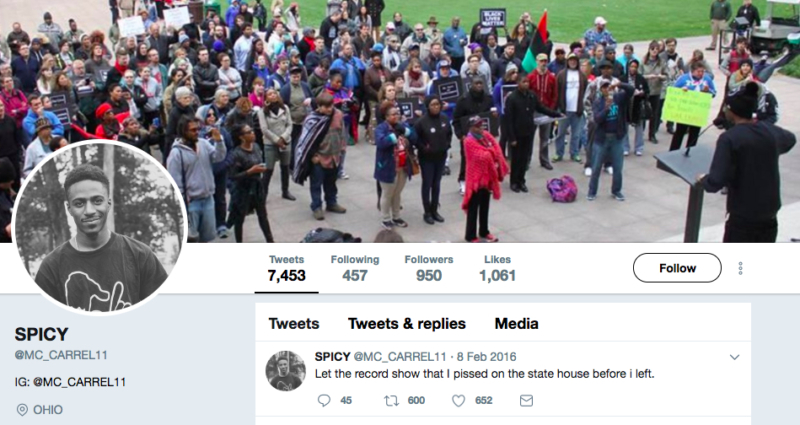By Jaime Gonzalez
I remember it in sequential order, in the same way, no matter how or when I think about it.
It was a month into the 2016 winter term at Lawrence University in Appleton, Wisconsin, and we were on a five-minute break from my history class. Consistent with every other break, the first thing I did was look at my phone and scroll down my Facebook newsfeed. It was one of the first posts on my feed, a news link. I read it.
His name was Marshawn McCarrel, an Ohio activist who organized around police brutality and homelessness in his community. He was 23 years old.
The headlines read, “Black Lives Matter activist fatally shoots himself in front of Ohio Statehouse.” At around 3 p.m., Marshawn took his own life after tweeting, “My demons won today. I’m sorry.”
So many emotions and thoughts filled my mind, body and soul, the most evident, a selfish despair. I questioned my own activism and the toll it had taken on me. A couple of months before, near the end of fall term, students of color at Lawrence University submitted a list of demands to the college president. As the lead organizer, it was my job to ensure that students of color were included in the decision-making process, that the university heard their demands.
We received echoes of support, yet these were overpowered by the opposition, which quickly escalated into death threats against students of color. For many of us, what initially felt like a victory—creating positive change on campus—was quickly burned to the ground by blatant racism from in and outside of our campus community. We gathered in the Diversity Center because we felt a sincere attack on our safety, like bombs were going off all around us and we were left to defend ourselves. We—students and a handful of staff and faculty—felt betrayed. It took all we had to finish finals, grasping for winter break only days away. Then we’d be free.
This entire experience is one I have yet to fully reconcile. It was a violent time that broke me down physically, mentally, and spiritually. Everything happened so quickly, so unexpectedly. As the hate poured in, I felt love, empathy, and humanity leave my body and take my internal flame with it. I went home for that winter break with little sense of hope and with a fear of never regaining what was taken from me. It felt as if my demons were going to win, and I had no agency over my body.
Returning for winter term was difficult. I had to be both a full-time student and the intermediary between the students and the University. It was a position I had gladly taken on—without being fully aware of the associated risks. This was my senior year of college and I was the Chair of the Committee on Diversity Affairs, a sub-committee of our student body government. I was also serving full-time through an AmeriCorps term of service, providing programming assistance at a local nonprofit for ten hours a week, and babysitting on the side. The last thing on my mind was, ironically, classes. And now I had to see the faces of all the people on campus who had opposed us and pretend as though everything was okay.
I asked myself one question: Is it worth it?
When my history class was over, I went straight to my counselor to talk through what I had just read about Marshawn. Although I am not black and will never be able to fully understand his experience in this world, I found many connections between Marshawn and myself. We were both young men of color, in college, and had been organizing in the Midwest around issues we were passionate about. We understood we had a responsibility and a need to spread love to those around us.
I spent some time reading more about Marshawn, changing my cover photo in his honor, and praying the ancestors would care for him in the next life. I didn’t know Marshawn, but I took his story as a sign to reconsider my activism, the energy I was channeling, and the time I was devoting to the movement. I was ready to disconnect and dedicate myself to my studies so I could graduate and move on to bigger and better things.
It took me two weeks to find an answer to my question. I was grateful I had a community of support from other people of color on campus, a counselor checking in with me weekly, and fraternity brothers who offered their support. If it weren’t for them I’m not sure I would have made the decision to continue working with the President’s Committee on Diversity Affairs to create viable solutions to the concerns of students of color.
As odd as it sounds, it was Marshawn’s second tweet that put everything into perspective for me: “Let the record show that I pissed on the state house before I left.”
That statement—the last declaration of resistance, the refusal to submit to injustice—lit the match and rekindled my internal flame. Marshawn reminded me of something so easily forgotten: We are only human. As people of color, especially, our lives are constantly centered around violence and pain, but we should remind ourselves of how we actively resist, invent, and transform all of that into something more.
The poet Rupi Kaur said it best:
the world
gives you
so much pain
and here you are
making gold out of it
– there is nothing purer than that.
It was Marshawn’s story that allowed me to make gold, to reconnect with the essence of my activism, grounded in love, joy and resilience. He provided me with hope when I had none, strength when I had lost it, and love when I needed it most.
Author’s note: As of today, Lawrence University has progressed in the realm of diversity and inclusion by offering diversity trainings to faculty and staff, hiring a Diversity and Inclusion Coordinator, renovating a new space for the Diversity Center, hiring various faculty and staff of color, and implementing a bias incident reporting system.
Jaime F. Gonzalez, Jr. is an independent Chicano scholar-activist whose work centers around queer people of color and the ways in which they transform the world around them. He is currently the Assistant Director of the Cassandra Voss Center in De Pere, WI, an innovative gender and identity center whose mission is to foster transformative thinking for a just world. He has also presented at local and regional conferences, including the 2017 Midwest Bisexual, Lesbian, Gay, Transgender and Ally College Conference (MBLGTACC).


Share your thoughts about this.